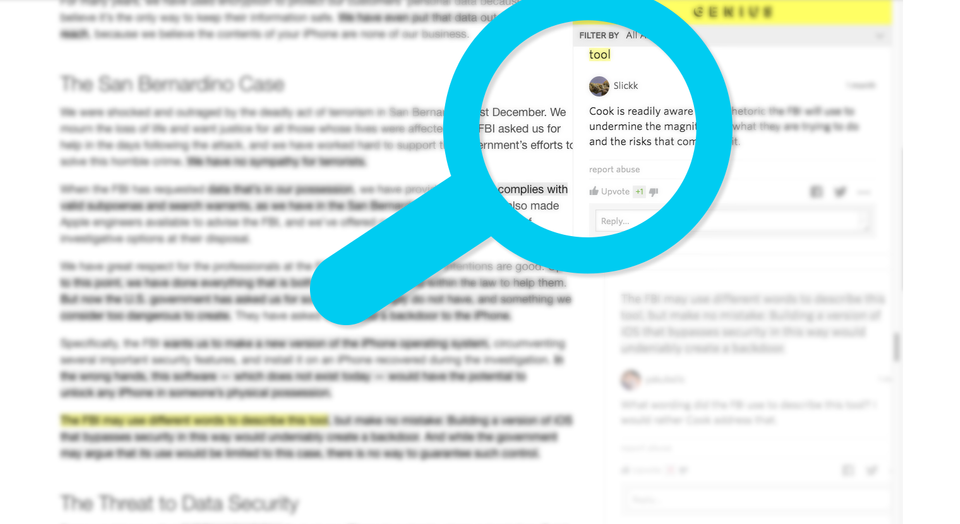Whose website is it, anyway?

A woman who blogs about sex writes a post about how demeaning it is to say someone with herpes is “suffering” from the disease and strangers on the Internet respond with snide commentary.
“FFS really?” replies a member of the virtual peanut gallery.
Unlike the comments sections of most websites or online discussion forums, these conversations can’t be easily found or turned off. That’s because they’re happening inside the News Genius Web Annotator, a browser add-on that lets anyone comment on almost any post on the Internet. Though commentary appears layered on top of the original site, it lives on a separate page, which you can access inside any browser by adding ‘genius.it’ at the beginning of the URL.
“News Genius is an intriguing idea, but my fear is with anonymity you’re going to find an awful lot of abuse.” — Stephen Balkam, CEO, Family Online Safety Institute
Publications like the Washington Post have embraced News Genius, allowing readers to annotate documents like Apple CEO Tim Cook’s letter to the FBI over the recent encryption controversy. Even the White House uses it. And when used well, it can add valuable information to a post and offer new avenues of discussion.
But because News Genius can be layered on top of almost any site, it adds a level of commentary some Web authors don’t welcome and can do little to stop. News Genius users celebrate this as a victory of free speech over censorship. Others, like herpes and sex blogger Ella Dawson, decry it as an “invasive violation.”
In a post titled “How News Genius Silences Writers,” Dawson argues that allowing conversations to take place on top of her blog without her consent was akin to “discovering graffiti over some of my most personal work.” And she feared a chilling effect, if News Genius turns into a way for anonymous strangers to abuse her and others on the Internet.
Naturally, her post was annotated by News Genius users.
How News Genius handles abuse
Amid a growing scrutiny, Genius CEO Tom Lehman touted the company’s anti-abuse measures, and introduced a new “report abuse” button.
“News Genius is an intriguing idea, but my fear is with anonymity you’re going to find an awful lot of abuse,” says Stephen Balkam, founder and CEO of the Family Online Safety Institute.
And when angry annotators morph into an unruly mob, the costs can be great—like it was for Zoe Quinn, Anita Sarkeesian, Brianna Wu who had their personal details posted on Internet forums and received multiple death threats as part of an organized campaign of harassment called GamerGate.
The pros of engaging directly with readers are clear for news organizations, says Natalie Stroud, associate professor of communication studies at the University of Texas at Austin, and director of the Engaging News Project. When readers argue with one another in the comments, she says, both traffic and revenues can rise.
Several news organizations she’s talked to have “open comment sections because of the revenues they earn from the space,” Stroud says. “We also have heard that polarization and incivility can be profitable.”
But major sites also risk their reputations and long-term popularity by allowing abusers to run rampant. Since the nadir of GamerGate, both Twitter and Reddit have revised their policies and added more tools for reporting abuse and blocking harassers.
Ultimately, a lot of News Genius’ impact on public discourse and Internet abuse depends on how good the company is at moderating comments, and how popular the service becomes. At the moment, Genius employs one full-time moderator for Web annotations and a team of more than 100 community volunteers, a company spokeswoman says.
But News Genius’s safeguards are minimal at best. How the new abuse reporting process works is not exactly clear. Also, News Genius doesn’t require users to log in before commenting, so people are able to post comments using fake identities. That could make it much more difficult to block repeat offenders.
“Some of our the best discussions on highly active annotated pages come from logged-out readers,” the spokeswoman says. She adds that the service hasn’t ecountered any “serial abusers,” and that it has “a moderation system in place and plans for scaling those resources as usage increases.”
She says that News Genius has no plans to allow publishers of personal sites to opt out, although a pair of Web developers have each released tools that technologically sophisticated publishers can use to block annotations.
The real question concerns the chilling effect on speech the mere potential for abuse might generate. Will bloggers self-censor to avoid becoming a target? There may never be a way to measure that.
“Women colleagues of mine, both those I know through my work and afield, are far more reticent to leave comments or even blog about anything remotely controversial online,” says Balkam. “That’s the absolute opposite of what we hoped for from the Web when it was created.”
